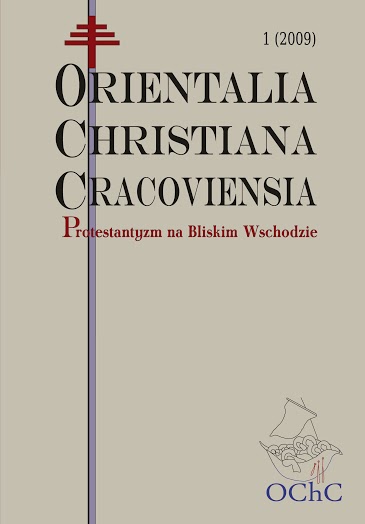Protestantism and Islam from the missiological perspective
DOI:
https://doi.org/10.15633/ochc.1004Keywords:
Protestantism, Islam, missions, missiologyAbstract
The presence of Christian missionaries amongst Muslims has raised numerous controversies from the very beginnings of the missionary movement. The history of missions shows that the missionary idea was far too frequently identified with colonialism as the missionary concept was regarded as superior to other cultures views.
Such an attitude towards missions often led to the objectification of other cultures and religions as territories to be conquered and, consequently, increasing conflicts and divisions. It also had a great impact upon shaping a particular picture of the relations between Christian missionaries and Muslims.
In order to build bridges between Christianity and Islam in the light of the new ecumenical paradigm of missions one needs first to realize and revise improper attitudes and assumptions made by Christian missionaries. It may be assumed that at first missionaries entered the Muslim culture with the vision of Western-style Christanisation, without paying proper respect to the religious values deeply rooted in the given culture. Such an attitude favored the development of mutual prejudice or even conflict. The crusade mentality which was represented by numerous Christian missionaries had been an attempt to gain new converts from among Muslims, often resulting in antagonistic attitudes from Islamic followers towards Christians. In time, however, such attitudes changed for the benefit of searching for Christian elements in Muslim culture. Hence the reading of the Koran with considering Christian elements (e.g. the Koranic term of Isa – Jesus, al-Masih – Messiah, and others) and an attempt to build bridges on their foundations. The missiological trend with the largest number of possibilities currently being contextualised, although it functions in various models (it has been presented in detail by, among others, John Travis).
References
Aagaard J., Trends in Missiological Thinking During the Sixties, „International Review of Mission” 62 (1973) nr 245, s. 8–25, http://dx.doi.org/10.1111/j.1758-6631.1973.tb01047.x.
Accad F. E., Building Bridges, Colorado Springs 1997.
Anderson G. H., Christian Mission in A.D. 2000. A Glance Backward, „Missiology. An International Review” 28 (2000) nr 3, s. 275–288, http://dx.doi.org/10.1177/009182960002800302.
Bevens S., Models of Contextual Theology, Maryknoll 2000.
Bosch D., Transforming Mission. Paradigm Shifts in Theology of Mission, Maryknoll 1991.
Braswell G. W., Islam. Its Prophet, Peoples, Politics and Power, Nashville 1996.
Gilchrist J., Facing the Muslim Challenge, Cape Town 1999.
Hesselgrave D. J., Rommen E., Contextualization. Meanings, Methods and Models, Grand Rapids 1992.
Hiebert P. G., Evangelism, Church, and Kingdom, [w:] The Good News of the Kingdom. Mission Theology for the Third Millennium, ed. by C. Van Engen, D. S. Gilliland, P. Pierson, Maryknoll 1993.
Jameson R., Scalevich N., First-Century Jews and Twentieth-Century Muslims, „The International Journal of Frontier Missions” 17 (2000) nr 1, s. 33–40.
Kirk A. J., What is Mission? Theological Explorations, London 1999.
Kubacki J., Czy chrześcijanie potrzebują innych religii?, „Życie Duchowe” 56 (2008).
Massey J., God’s Amazing Diversity in Drawing Muslims to Christ, „International Journal of Frontier Missions” 17 (2000) nr 1, s. 7.
McDermott G. R., Can Evangelicals Learn from World Religions? Jesus Revelation and Religious Traditions, Downers Grove 2000.
Parrinder G., Jesus in the Qur’an, New York 1977.
Parshall P., Danger! New Directions in Contextualization, „Evangelical Missions Quarterly” 34 (1998) nr 4, s. 404–410.
Patalon M., Dialogiczny charakter misji chrześcijańskiej, [w:] Misja w Polsce jako problem międzykościelny, pod red. T. J. Zielińskiego, Warszawa-Katowice 2006.
Penner P., Discerning and Following God’s Mission, „Journal of European Baptist Studies” 4 (2004) nr 2, s. 34–39.
Reapsome J., Carey, William, [w:] Evangelical Dictionary of World Missions, general editor A. S. Moreau, Grand Rapids 2000, s. 162.
Ryad U., Koraniczne perspektywy dialogu międzyreligijnego, [w:] Księgi Święte płaszczyzną dialogu?, pod red. nauk. J. J. Stefanowa i A. Wąsa, Warszawa 2006.
Sakowicz E., Głoszenie Chrystusa a dialog o Bogu z muzułmanami, [w:] Odkupienie a dialog międzyreligijny. Materiały z sympozjum w Obrze 20–21 kwietnia 1998 r., red. W. Kluj, Poznań 1999.
Scherer J., Gospel, Church and Kingdom. Comparative Studies in World Mission Theology, Minneapolis 1987.
Shenk D. W., Global Gods. Exploring the Role of Religions in Modern Societies, Scottsdale 1999.
Shenk D. W., Faithful Christian Witness Among Muslims, [w:] Christian Presence and Witness Among Muslims, ed. P. Penner, Schwarzenfeld 2005.
Thomas N. E., Classic Texts in Mission and World Christianity, Maryknoll 1995.
Travis J., The C1 to C6 Spectrum, „Evangelical Missions Quarterly” 34 (1998) nr 4, s.407–408.
Tworuschka M. i U., Islam. Mały Słownik, przekł. J. Marzęcki, Warszawa 1995.
Whiteman D. L., Contextualization. The Theory, the Gap, the Challenge, „International Bulletin of Missionary Research” 1 (1997), s. 2–7.
Yates T., Christian Mission in the Twentieth Century, Cambridge 1994.
Downloads
Published
Issue
Section
License
Twórca oświadcza, że przysługują mu prawa autorskie do utworu i że nie są ograniczone w zakresie objętym niniejszym oświadczeniem oraz że utwór jest dziełem oryginalnym i nie narusza praw autorskich innych osób.
Twórca zezwala Uniwersytetowi Papieskiemu Jana Pawła II w Krakowie na nieodpłatne, niewyłączne i nieograniczone w czasie korzystanie z utworu, to jest:
- utrwalanie i zwielokrotnianie: wytwarzanie egzemplarzy utworu techniką drukarską, reprograficzną, zapisu magnetycznego oraz techniką cyfrową;
- obrotu oryginałem albo egzemplarzami, na których utwór utrwalono (wprowadzanie do obrotu, użyczenie lub najem oryginału albo egzemplarzy, publiczne wystawienie, wyświetlenie, a także publiczne udostępnianie utworu w taki sposób, aby każdy mógł mieć do niego dostęp w miejscu i w czasie przez siebie wybranym);
- włączenie utworu w skład utworu zbiorowego;
- udzielanie przez Uniwersytet Papieski Jana Pawła II w Krakowie sublicencji Creative Commons Uznanie autorstwa-Użycie niekomercyjne-Bez utworów zależnych 3.0 Polska
Uniwersytet Papieski Jana Pawła II w Krakowie udostępnia utwór na Platformie Czasopism należącej do uczelni, na licencji Creative Commons Uznanie autorstwa-Użycie niekomercyjne-Bez utworów zależnych 3.0 Polska. Tym samym uprawnia wszystkich zainteresowanych do korzystania z utworu pod następującymi warunkami:
- zostanie podany autor i tytuł utworu,
- zostanie podane miejsce publikacji (tytuł czasopisma i adres internetowy do oryginalnie opublikowanego utworu),
- utwór będzie dystrybuowany w sposób niekomercyjny,
- nie będą tworzone utwory zależne.

